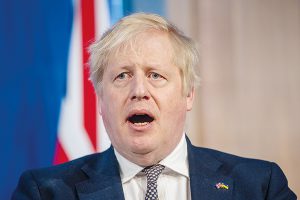Reflected glory is often the best way to come by extra kudos. And so Boris Johnson has been basking in Volodymyr Zelenskiy’s praise for his firm stand against Russia’s invasion of Ukraine.
The prime minister has now doubled down on his support. As well he might. The war has saved Johnson’s leadership from a sense of downward drift. The question is whether the lull is temporary relief or a return to superhero status for a battered but resilient prime minister.
Revelations of unauthorised parties at No. 10 Downing Street during lockdown almost sunk Johnson after the festive season. National opinion polls showed the opposition Labour party peaking with a 9.5% lead over the Conservatives from late January to mid-February. Even Johnson’s ratings among the party faithful went negative: A number of his MPs formally backed a leadership contest, and more let it be known in WhatsApp groups and Commons tea-room gossip that they were considering dropping the pilot.
But British politics is prone to sudden shifts, and Labour’s lead in the polls has now been cut to 5%. Johnson’s clarion calls to defend Ukraine have seen his fortunes revive. Polemics over parties and whether the prime minister was
“ambushed by (birthday) cake†seem trivial when set against a real war in eastern Europe. A poll of party members this week saw Johnson’s personal standing rise 15 points, back into positive territory.
And no doubt, Johnson has gotten lucky on the home front too. The popularity of his once hotly tipped successor Rishi Sunak has gone into free fall. The chancellor’s financial Spring Statement last week was badly received by friend and foe alike. Almost four-fifths of voters slated it as an inadequate response to the urgent cost-of-living crisis that has seen energy bills shoot up. It was deemed as “unfair,†and Sunak, a polished technocrat, seemed to miss this point.
The chancellor’s personal wealth has since become a hot topic. A former Goldman Sachs banker, Sunak is rich on his own account, but not half as much as his wealthier wife Akshata Murthy. She owns 690 million pounds ($897 million) worth of shares in her father’s information-technology company, Infosys, but is domiciled in India. This means she doesn’t need to pay taxes in the UK on dividends from the stake.
The legal arrangement was openly declared when Sunak first became a minister in 2016. But as tax rises announced last year finally start to hit voters, Labour is gleeful at the chancellor’s embarrassment.
And it would only be human for Johnson to gloat at seeing his most credible rival afflicted. According to the polls, British voters blame the cost-of-living crisis on Covid (62%) and Ukraine (57%) rather than on the prime minister personally (51%). Can Johnson’s luck last?
Local elections held nationwide on May 5 will be the test.
“Partygate†has returned to the headlines after all. Police are belatedly fining those who broke lockdown rules at No. 10, reviving the most damaging charge against the Conservatives — that there is “one rule for them and another for everyone else.†Sunak’s wife’s favorable tax treatment fits into that narrative too. Her “non-dom†status is hardly an option open to most voters.
Johnson, however, will be marketed by his party as a statesman. Forty years ago, the successful campaign to recapture the Falkland Islands from Argentina saved Margaret Thatcher despite record unemployment at home.
Voters rally to the flag when the government takes a stand against a foreign power, but this time Labour has been more careful to beat the patriotic drum too (in 1982, its pacifist wing was vocal and its leader looked weak).
The opposition calls for even harsher sanctions against Russia and criticises the government for admitting so few Ukrainian refugees to the UK despite its promises.
As a biographer of Winston Churchill, Johnson knows that success in war does not guarantee winning the peace. Britain’s World War II leader is honoured for his inspiring leadership against the Nazis, but his people threw him out of office soon after victory. Unlike his Labour opponents, Churchill offered no compelling vision of a fairer, peacetime Britain. What is Johnson’s? Like Churchill in 1945, the prime minister just offers more of the same — himself.
In truth, his great work, like it or loathe it, was Brexit. But that mission was accomplished by early 2020, leaving only the trailing wires of messy implementation. The pandemic, despite Johnson’s bumbling performance at the outbreak, and war in Ukraine have conveniently filled the policy vacuum. Otherwise, the prime minister’s trajectory has been dictated by scandals and internal party rebellions.
Where is the program of renewal and reform needed to boost productivity and make up for the post-Brexit loss of access to the European single market?
The government’s much-trumpeted energy security strategy was finally published. It had all the substance of a press release. There was also the familiar kowtow to a handful of
Conservative MPs in rural seats who might swing a leadership election, but no changes to the planning system that blocks the development of onshore wind, the fastest way to deliver cheap renewable energy.
Still, as long as Tory MPs are not signing letters calling for a leadership election, Johnson is a happy man. On May 5, his party will be watching the results with a gimlet eye. He had better not disappoint.
—Bloomberg
Martin Ivens was editor of the Sunday Times from 2013 to 2020 and was formerly its chief political commentator. He is a director of the Times Newspapers board
 The Gulf Time Newspaper One of the finest business newspapers in the UAE brought to you by our professional writers and editors.
The Gulf Time Newspaper One of the finest business newspapers in the UAE brought to you by our professional writers and editors.

